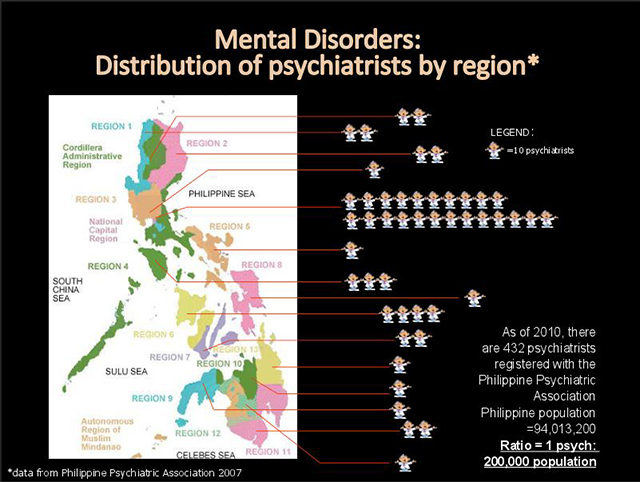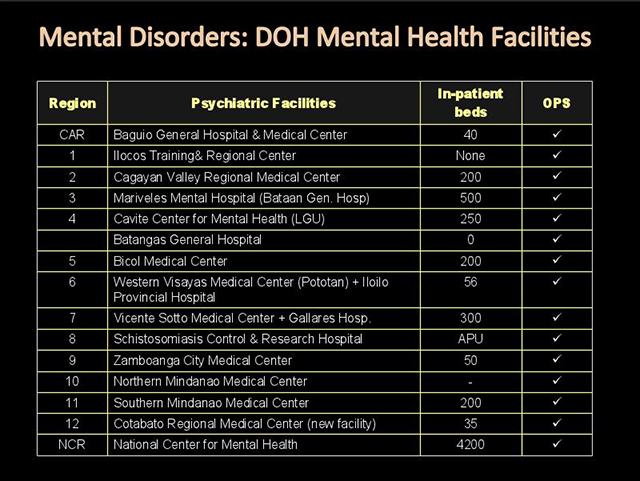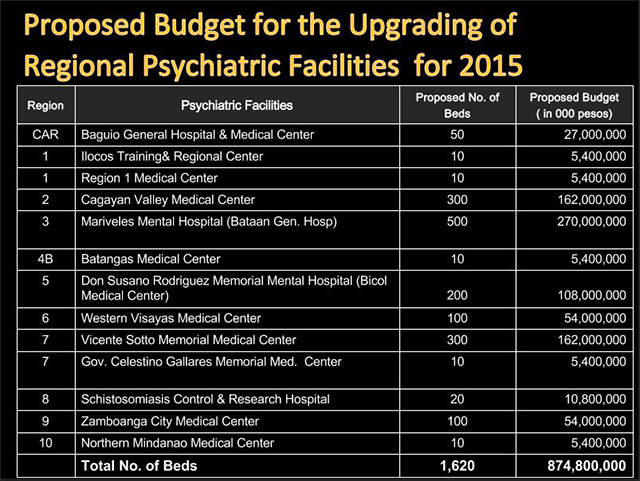Filtered By: Lifestyle
Lifestyle
The elephant in the room: Myths about mental health in PHL
By TRISHA MACAS, GMA News

Statistics on the distribution of Philippine psychiatrists. All photos from NCMH
Stigmatized, ignored, poorly funded.
This is how National Center for Mental Health (NCMH) chief Dr. Bernardino Vicente described the situation of mental health in the Philippines at The Second Healthy Mind Summit in Taguig City on Wednesday.
The conclusion is based on the information he collated and his personal experiences as a psychiatrist and NCMH chief.
Fragmented truths
It has been reported that the suicide rate in the Philippines is 1/100,000, making Filipinos some of the happiest people in the planet. However, Vicente believes the number is not accurate.
He pointed out that the Philippines has an inadequate mental health information system.
"The information system that we have is largely fragmented. Sometimes we have a lot of under-reporting. The quality of the data? We are not even sure. We are not even sure if we are the happiest people in the whole world [debunked by last year's UN World Happiness Report]," the NCMH chief said.


DOH mental health facilities are not enough for the number of patients.
Mental health phobia
Vicente noted that mental health is often stigmatized and dichotomized from physical health.
"In the eyes of many, mental health and physical health are two separate things. Hindi pinagsasama 'yan usually," he said.
That is why there are still many hospitals that do not have psychological first aid and medicines, such as anti-depressants, for mental health, he explained.
Vicente said, "There are still a lot of myths that we need to demystify about mental heath."
The stigma, he said, comes from the punitive mental health services in the Philippines. People with mental health needs are often isolated, giving rise to "horror stories" about psychiatric patients.
Instead, there must be mental health services that are curative and symptoms-based.
Reaching out to far-flung communities
Medication and other treatments are only centralized in national and regional mental health institutions. They are rarely available in far-flung communities, if at all.
Vicente said there is only one psychiatrist for every 200,000 Filipinos, and most of these doctors are based in urban areas. This illustrates the inequity in the distribution of mental health workers in the Philippines, he said.

Budget and financial disorders
Programs associated with mental health also create stigma; hence, they are not prioritized in terms of funding.
"Chances are, you won't get budget (for them)," Vicente said.
He said that even though the Department of Health has a budget of P87 billion this year, they still have to fight to approve financing for mental health programs.
The budget for mental healthcare is "tied to psychiatric beds" and none for wellness and preventive programs. Vicente added that mental health centers are dilapidated, noting once again the lack of budget for maintenance and repairs.
With no clear program on mental wellness and only 0.5 psychiatrists for every 100,000 Filipinos, how can the nation achieve peace of mind?
For Vicente and the rest of the National Program Management Committee on Mental Health, mainstreaming mental health in everyday life and lawmakers passing the first Mental Health Act in the Philippines are the first steps to take in achieving holistic health. — VC, GMA News
More Videos
Most Popular



